The world of Search Engine Optimization (SEO) is in a constant state of flux. Google’s algorithms are updated thousands of times a year, and new technologies are continually emerging that change the way we approach online visibility. One of the most significant and talked-about advancements in recent years is the integration of Artificial Intelligence (AI) into SEO practices. While the term “AI” might conjure up images of science fiction, its practical applications in the SEO realm are very real and are already revolutionizing workflows for marketers and business owners alike.
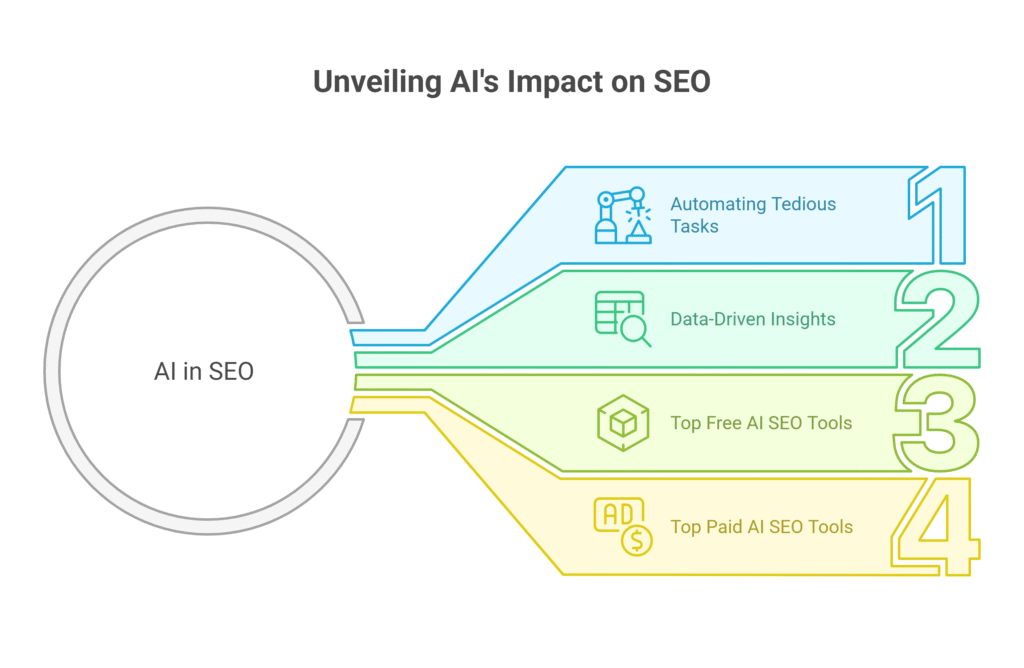
This blog post will cut through the hype and provide a practical guide to the AI tools that can genuinely enhance your SEO efforts. We’ll explore how AI is reshaping the SEO landscape, from automating tedious tasks to providing deep, data-driven insights. We will also provide a comprehensive list of the top free and paid AI SEO tools available today, helping you to make an informed decision about which solutions are right for your needs and budget.
The Growing AI SEO Market
The adoption of AI in SEO is not just a theoretical concept; it’s a rapidly expanding market. The global AI SEO software tool market is projected to grow significantly in the coming years, indicating a strong industry shift towards AI-powered solutions. This growth underscores the increasing recognition of AI’s value in streamlining SEO processes and delivering measurable results.
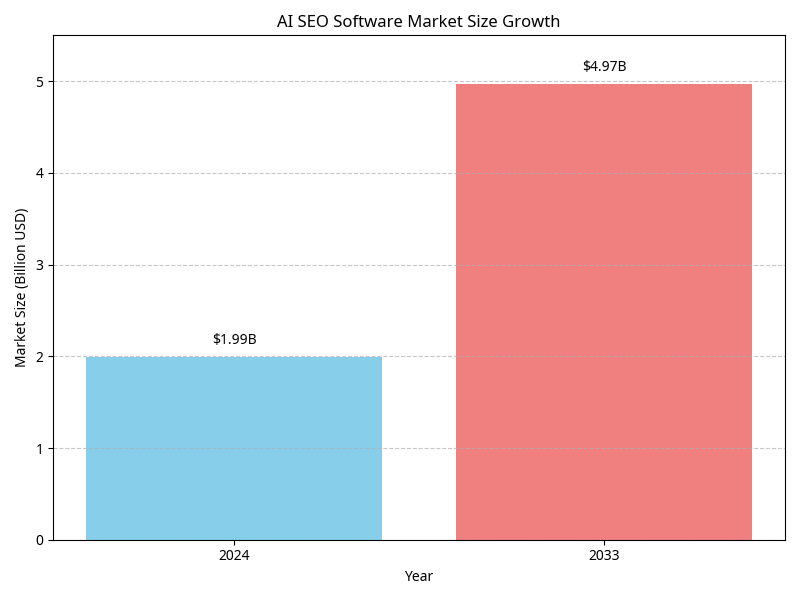
How AI is Reshaping SEO
AI’s influence on SEO is multifaceted, extending beyond simple automation to fundamentally change how we understand and interact with search engines. The adoption rates among SEO professionals highlight this shift:
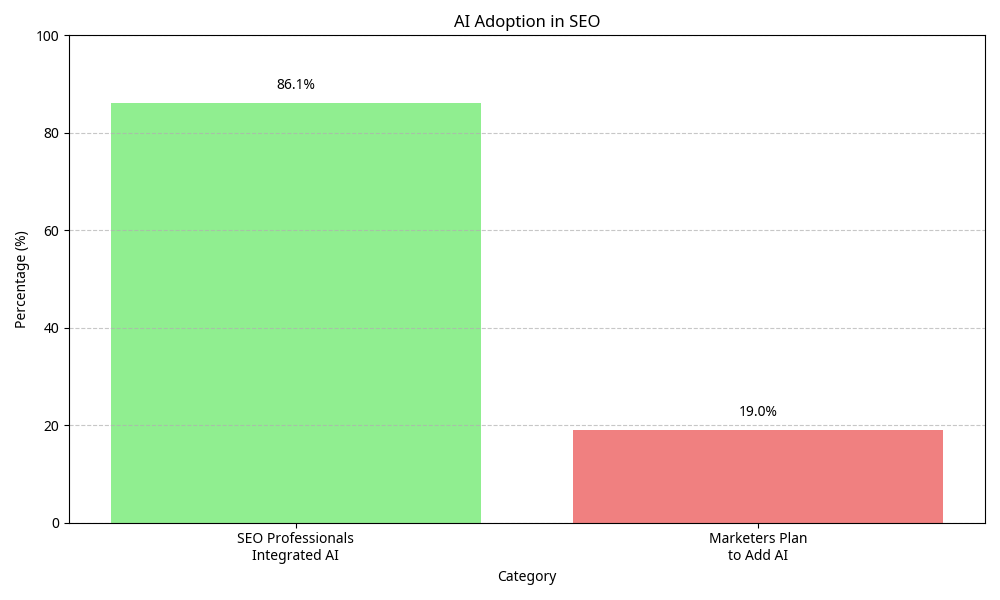
1. Enhanced Keyword Research and Intent Understanding
Traditional keyword research often involved manual sifting through data and making educated guesses about user intent. AI-powered tools, however, can analyze vast datasets of search queries, identify emerging trends, and even predict future keyword performance with remarkable accuracy. More importantly, AI excels at understanding search intent – the underlying goal a user has when typing a query. This semantic understanding allows SEOs to create content that truly answers user questions and fulfills their needs, leading to higher rankings and better engagement. For instance, AI can differentiate between transactional, informational, navigational, and commercial investigation queries, enabling more precise content targeting.
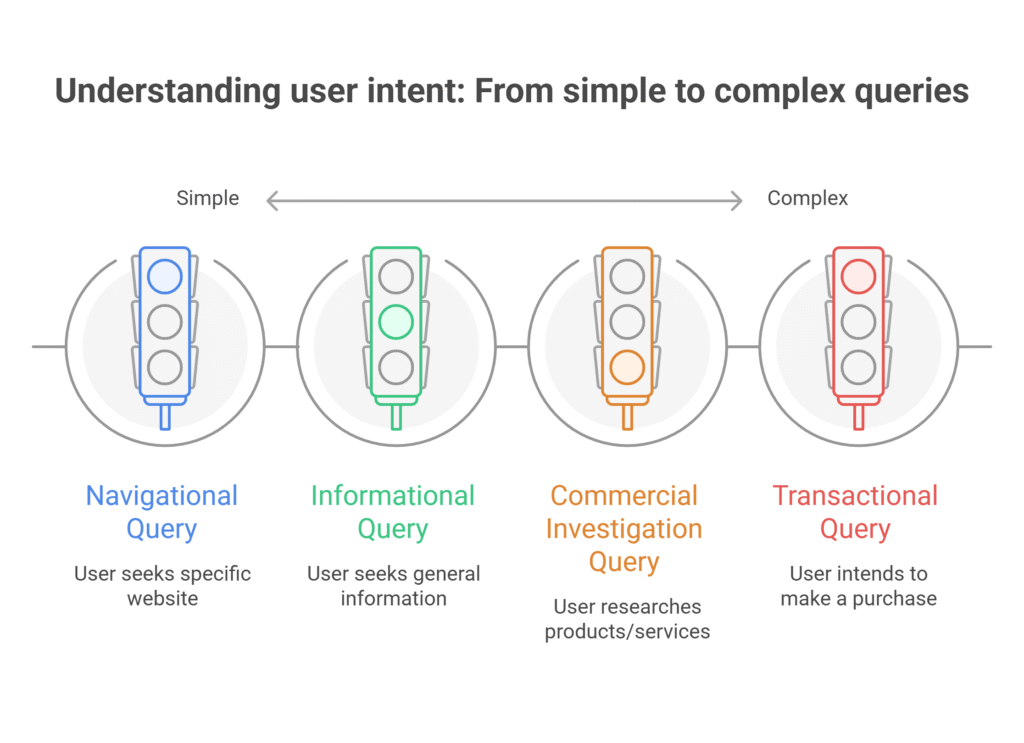
2. Intelligent Content Creation and Optimization
One of the most visible applications of AI in SEO is in content generation and optimization. AI writing assistants can help overcome writer’s block, generate outlines, draft articles, and even create entire pieces of content. While human oversight remains crucial for quality and originality, AI significantly speeds up the content creation process. Beyond creation, AI tools can analyze existing content for SEO gaps, suggest improvements for readability, optimize for target keywords, and ensure semantic relevance. They can identify opportunities for internal linking, suggest optimal content length, and even recommend schema markup to enhance visibility in SERPs.
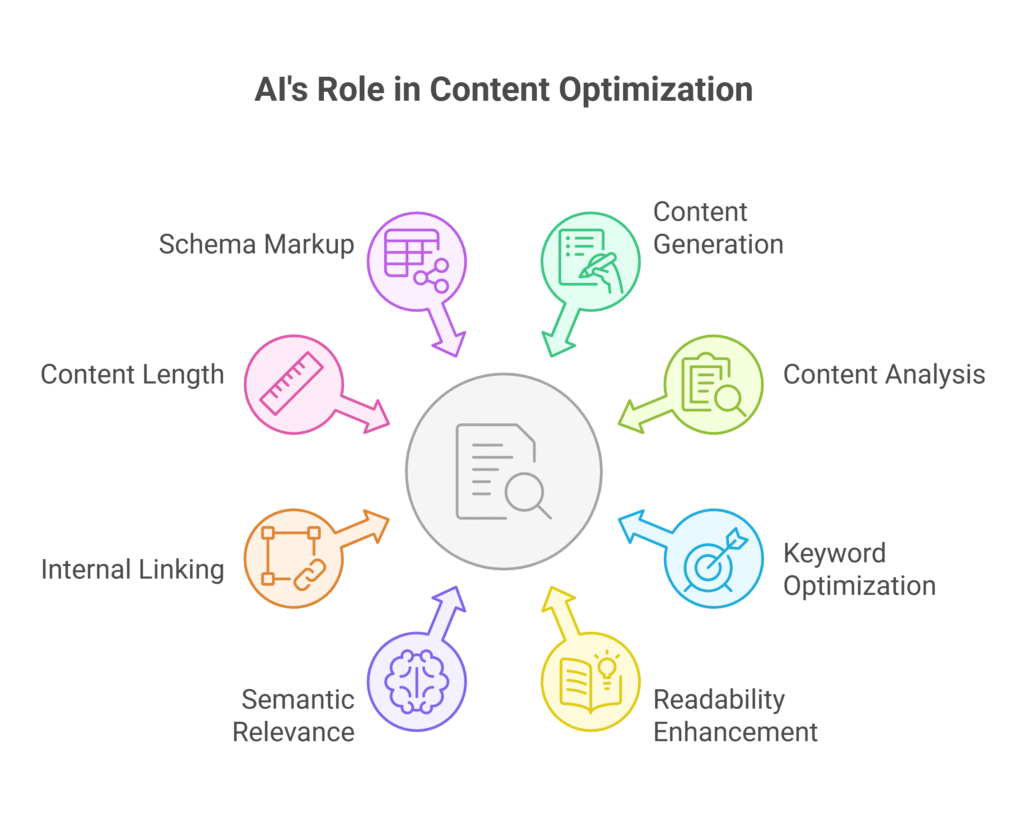
3. Advanced Technical SEO Audits and Fixes
Technical SEO is the backbone of any successful SEO strategy, and AI is making it more accessible and efficient. AI-driven crawlers can identify technical issues like broken links, crawl errors, site speed problems, and mobile usability issues much faster and more comprehensively than manual audits. Some advanced AI tools can even suggest specific code changes or configurations to resolve these issues, streamlining the optimization process. This automation frees up SEO professionals to focus on more strategic tasks rather than getting bogged down in repetitive technical checks.
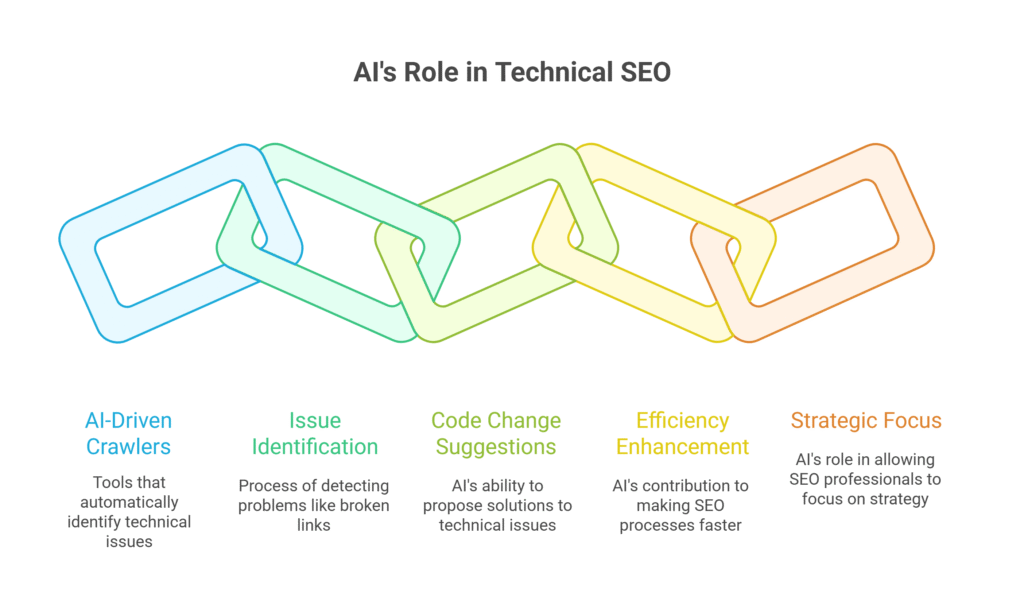
4. Predictive Analytics and Trend Forecasting
AI’s ability to process and analyze historical data allows it to identify patterns and predict future trends. In SEO, this translates to forecasting changes in search demand, identifying emerging topics, and even predicting algorithm updates. This foresight enables SEOs to proactively adjust their strategies, ensuring they stay ahead of the curve rather than reactively responding to changes. For example, AI can analyze seasonal trends, predict content decay, and highlight opportunities for evergreen content updates.
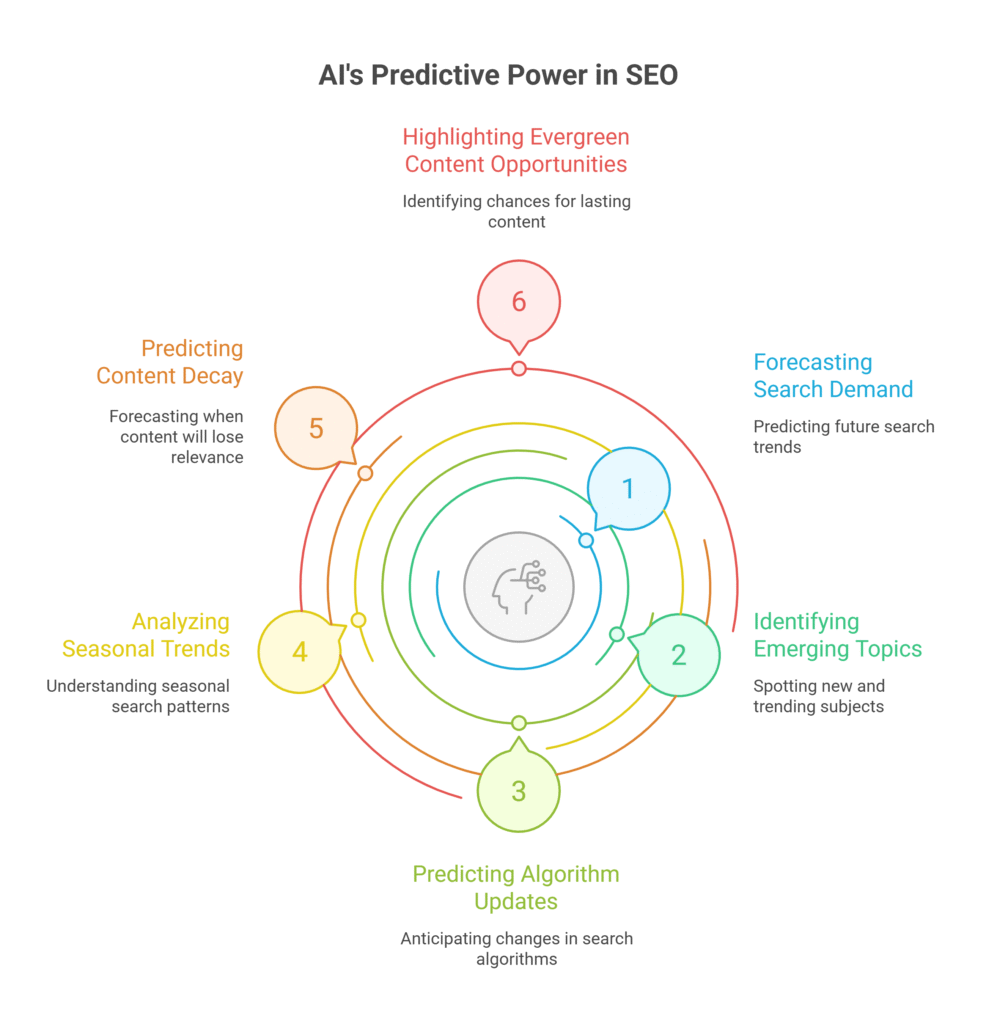
5. Personalized User Experiences
As search engines become more sophisticated, personalization is becoming increasingly important. AI helps in understanding individual user behavior, preferences, and past interactions to deliver highly personalized search results and website experiences. While direct control over search engine personalization is limited, AI tools can help optimize website content and structure to cater to different user segments, leading to improved user engagement and conversion rates. This includes dynamic content delivery, personalized recommendations, and adaptive user interfaces.
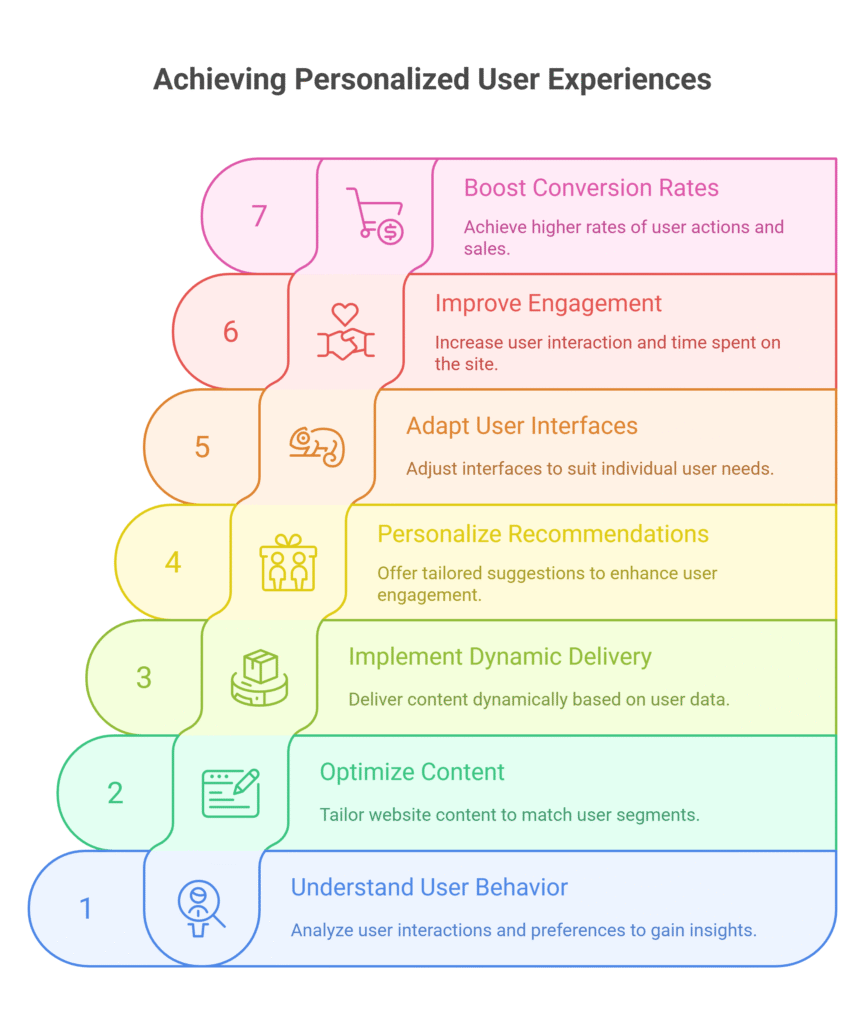
6. Streamlined Link Building and Outreach
Link building, a cornerstone of off-page SEO, can be a time-consuming process. AI tools can automate various aspects of link building, such as identifying potential link prospects, analyzing their domain authority, and even drafting personalized outreach emails. While human relationship-building remains vital, AI can significantly streamline the initial stages of the outreach process, making it more scalable and efficient. AI can also help in identifying toxic backlinks that could harm a website’s SEO and suggest disavowal strategies.
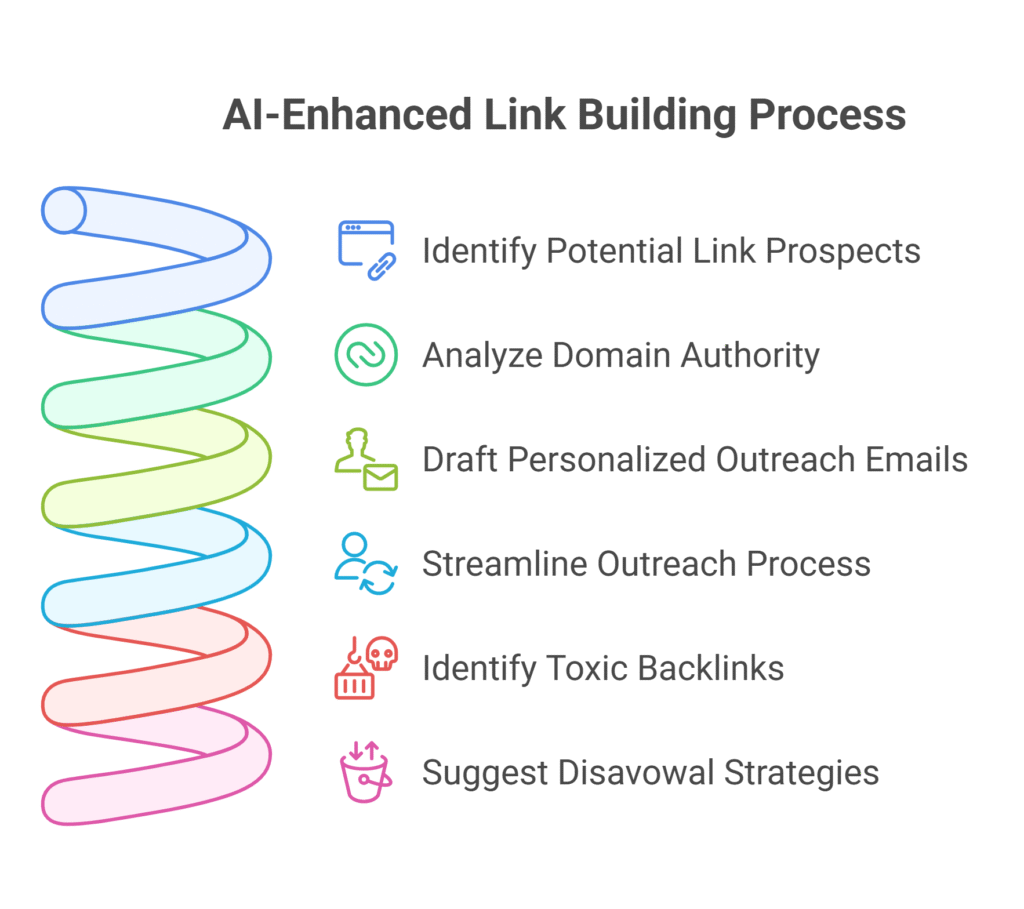
7. Enhanced Competitor Analysis
Understanding your competitors’ strategies is crucial for gaining a competitive edge. AI tools can analyze competitor websites, backlink profiles, keyword rankings, and content strategies at scale. This allows for a deeper and more granular understanding of what’s working for others in your niche, providing actionable insights to refine your own SEO strategy. AI can pinpoint competitor strengths and weaknesses, uncover their top-performing content, and reveal their most valuable backlink sources.
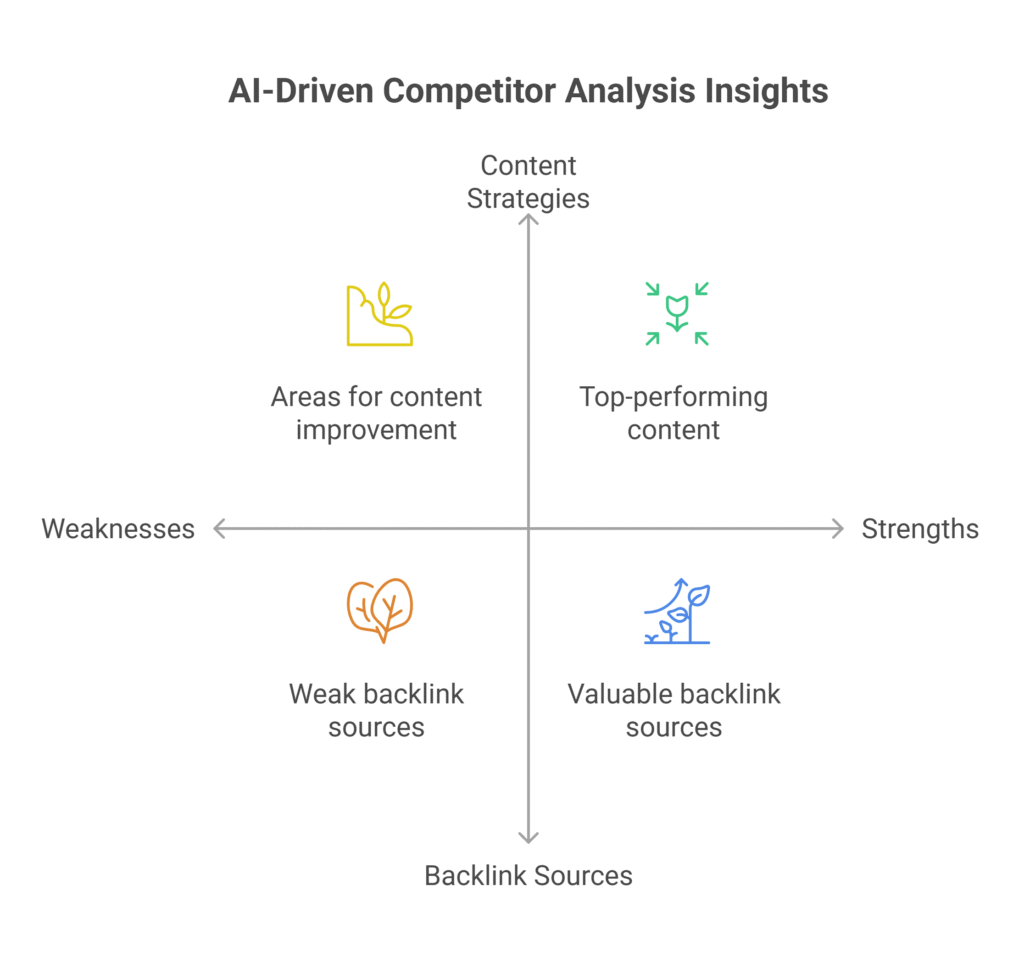
Top Free AI SEO Tools
While many powerful AI SEO tools come with a price tag, there are several excellent free options that can help you get started or augment your existing workflow. These tools often provide foundational AI capabilities that are invaluable for any SEO professional.
1. Google Search Console
While not explicitly an “AI tool,” Google Search Console (GSC) leverages Google’s advanced AI and machine learning algorithms to provide invaluable insights into your website’s performance in Google Search. It helps you monitor your site’s search traffic, performance, and indexing status. GSC can identify crawl errors, mobile usability issues, and provide data on search queries that bring users to your site. Its insights are directly from Google, making them highly authoritative for understanding how Google’s AI views your site.
2. Google Analytics
Similar to GSC, Google Analytics (especially GA4 with its event-driven data model) uses AI and machine learning to provide deeper insights into user behavior on your website. It can help you understand user journeys, identify popular content, and track conversions. AI-powered insights within GA4 can automatically flag significant changes in data trends, helping you quickly identify opportunities or issues.
3. ChatGPT (Free Version)
ChatGPT, and other large language models, can be incredibly versatile free AI tools for SEO. While not a dedicated SEO platform, it can assist with:
- Content Ideation: Brainstorming blog post topics, headlines, and outlines.
- Content Generation (Drafting): Creating initial drafts of meta descriptions, title tags, FAQs, and even short articles. (Always review and edit for accuracy, originality, and tone).
- Keyword Expansion: Generating long-tail keyword ideas based on a seed keyword.
- Semantic Entity Extraction: Helping to identify related entities and topics for semantic SEO.
- Basic Research: Summarizing complex topics or explaining SEO concepts.
4. Google Keyword Planner
Integrated within Google Ads, Google Keyword Planner is a free tool that uses Google’s vast search data to help you discover new keywords, research their search volume, and forecast their potential performance. While primarily for paid search, its keyword data is invaluable for organic SEO strategy, helping you understand demand and competition.
5. Yoast SEO / Rank Math (Free WordPress Plugins)
For WordPress users, the free versions of Yoast SEO and Rank Math offer AI-powered suggestions for on-page optimization. They analyze your content for keyword usage, readability, internal linking opportunities, and provide real-time feedback to help you optimize your posts and pages for search engines. While their advanced features are paid, the free versions are robust enough for many basic SEO needs.
6. Free SEO Audit Tools (e.g., SEOptimer, Seobility – limited versions)
Many SEO platforms offer free, limited versions of their audit tools. These can provide a quick snapshot of your website’s SEO health, identifying critical issues like broken links, missing meta tags, and basic performance problems. While not as comprehensive as their paid counterparts, they can be a good starting point for identifying areas for improvement. These often use AI to quickly scan and analyze website elements.
Top Paid AI SEO Tools
For those looking to invest in more comprehensive and advanced AI capabilities, the paid AI SEO tools offer a significant competitive advantage. These platforms often integrate multiple AI functionalities into a single, powerful suite.
1. Semrush
Semrush is an all-in-one SEO platform that has heavily integrated AI into many of its features. Its AI capabilities span:
- Content Marketing Platform: AI-powered content ideas, topic research, and content optimization suggestions based on top-ranking articles.
- Keyword Magic Tool: Advanced keyword research with AI-driven suggestions for long-tail keywords and semantic variations.
- On-Page SEO Checker: Provides AI-driven recommendations for improving on-page SEO based on competitor analysis.
- ContentShake AI: A dedicated AI writing assistant for generating SEO-friendly content.
2. Surfer SEO
Surfer SEO is renowned for its AI-powered content optimization features. It analyzes the top-ranking pages for your target keyword and provides data-driven recommendations for content length, keyword density, NLP (Natural Language Processing) terms to include, and overall content structure. Its AI helps ensure your content is not just keyword-rich but also semantically relevant and comprehensive.
3. Clearscope
Clearscope is another leading AI-powered content optimization platform. It uses advanced natural language processing to help you create highly relevant and authoritative content. Clearscope provides a content grade, identifies important terms and topics to cover, and helps you understand the intent behind search queries. It’s particularly strong for ensuring content depth and relevance.
4. Ahrefs
Ahrefs is a powerful SEO suite that, like Semrush, has been increasingly incorporating AI into its tools. While traditionally known for its backlink analysis, Ahrefs uses AI for:
- Keyword Research: Identifying keyword opportunities and analyzing their difficulty.
- Content Gap Analysis: Discovering keywords your competitors rank for but you don’t.
- Site Audit: AI-powered crawling and identification of technical SEO issues.
- Content Explorer: Finding top-performing content and identifying content trends.
5. Jasper (formerly Jarvis)
Jasper is a sophisticated AI writing assistant that can generate high-quality content for various purposes, including blog posts, ad copy, and social media updates. While not exclusively an SEO tool, its ability to produce large volumes of content quickly makes it invaluable for SEOs. It can be integrated with tools like Surfer SEO for optimized content creation.
6. Frase.io
Frase.io is an AI-powered content optimization tool that helps you research, write, and optimize content for search engines. It automates content briefs, identifies key topics and questions to answer, and provides a content score based on how well your content addresses user intent and covers relevant subtopics. Frase uses AI to analyze SERPs and provide actionable insights for content creation.
7. Search Atlas
Search Atlas is an emerging all-in-one AI SEO platform that aims to provide a comprehensive suite of tools for keyword research, content optimization, technical SEO, and reporting. It leverages AI to automate many aspects of the SEO workflow, offering a streamlined solution for agencies and businesses.
8. MarketMuse
MarketMuse is an AI-powered content intelligence platform that helps you build content strategies, optimize existing content, and identify content gaps. It uses AI to analyze your entire content inventory and compare it against your competitors, providing insights into content performance and opportunities for improvement. MarketMuse focuses on topic authority and content clusters.
9. Alli AI
Alli AI is an automated SEO platform that uses AI to implement on-page and technical SEO changes directly on your website. It can identify issues, generate optimized content, and even deploy code changes, making it a powerful tool for automating complex SEO tasks. It’s designed to provide a hands-off approach to SEO optimization.
10. BrightEdge
BrightEdge is an enterprise-level SEO platform that heavily utilizes AI for content optimization, competitive analysis, and performance tracking. Its AI-driven insights help large organizations manage complex SEO strategies, identify trends, and measure the ROI of their SEO efforts. It offers sophisticated reporting and forecasting capabilities.
Conclusion: Embracing the AI-Powered Future of SEO
The integration of AI into SEO is not a passing trend; it’s a fundamental shift in how we approach search engine optimization. From automating repetitive tasks to providing deep, data-driven insights, AI tools are empowering SEO professionals to work smarter, faster, and more effectively. Whether you’re just starting with free tools like Google Search Console and ChatGPT or investing in a comprehensive paid platform like Semrush or Surfer SEO, embracing AI is no longer an option – it’s a necessity for staying competitive in the ever-evolving digital landscape.
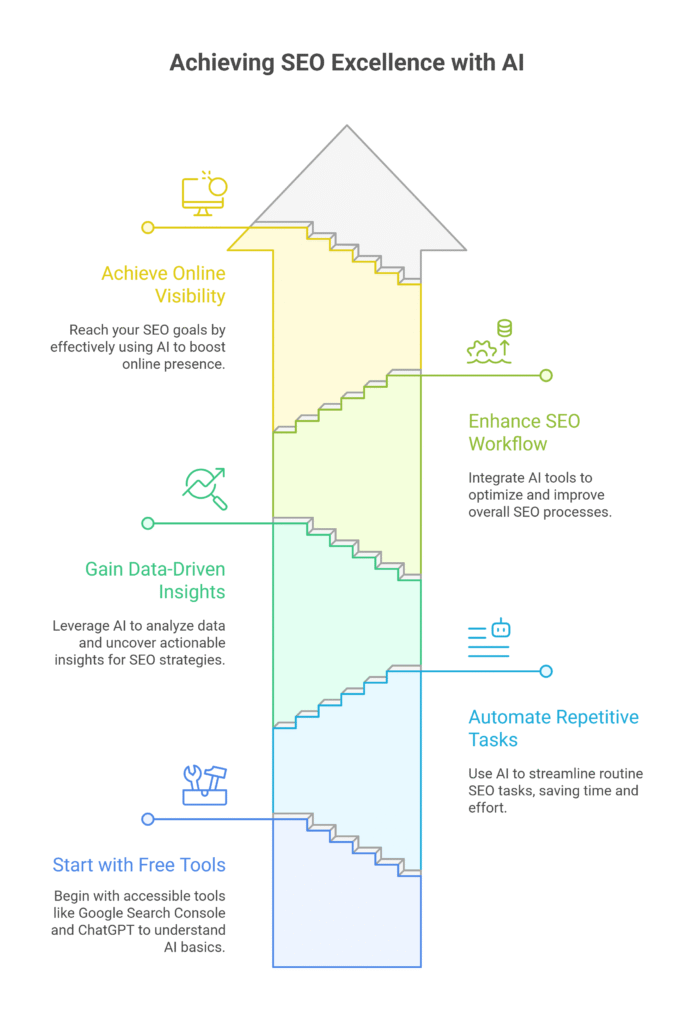
By leveraging the power of AI, you can move beyond the hype and unlock practical solutions that will revolutionize your SEO workflow, drive meaningful results, and ultimately, help you achieve your online visibility goals.
References
- Semrush – 8 Best AI SEO Tools for 2025
- HubSpot – 14 best AI SEO tools & how to use AI in 2025
- Exploding Topics – 9 Top AI SEO Tools I Recommend in 2025
- Self-Made Millennials – I Tried 12 AI SEO Tools (Paid & Free). Here’s What Works
- Whatagraph – We Tested the 11 Best (& Underrated) AI SEO Tools in 2025
